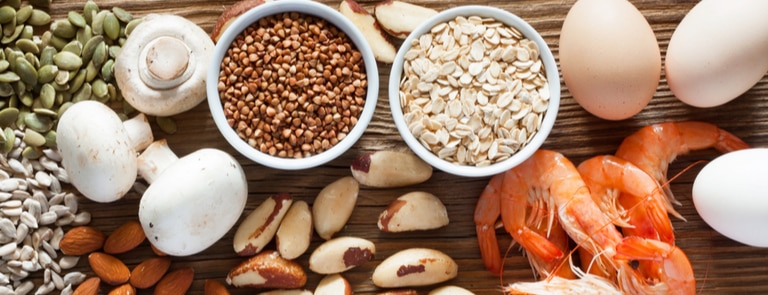B&C
|Carousel main title
Main title
Male fertility: The role of selenium & good circulation

If you’re concerned about your fertility, you’re definitely not alone.
Fertility issues among men are increasingly common, with research published in 2017 suggesting that sperm count among men has halved in the last 40 years.1
What causes fertility issues in men?
The quality of sperm is usually to blame.
Factors such as diet, smoking and excess body fat are major causes of reduced sperm quality, so these are the first places to start when aiming to boost your fertility.
However, the trace element selenium is strongly linked with male fertility, so it’s well worth taking a look at your intake of selenium if you and your partner are trying to become pregnant.
A guide to selenium
Find out how selenium helps your health and what foods provide it.


The role of selenium in sperm health
Selenium is essential for sperm function.
Selenium contributes to the morphology of sperm as well as its mobility, which means selenium not only helps sperm cells grow to a good size and shape, but also helps them to swim, which are key factors in normal conception.
Selenium can also ensure your sperm doesn’t become damaged by free radicals within the body.
Just like any of your body’s cells, sperm cells are susceptible to oxidative damage.
Selenium is an antioxidant which can help protect sperm from this cellular damage.
There is a clear scientific link between having optimum levels of selenium and male fertility.
One study from 2011 looked at the effects of selenium in combination with vitamin E on 690 infertile men, over 100 days.
The results of the study showed a 52% improvement in sperm motility, size and shape. There was also a 10.8% rate of pregnancy among the partners of the men.2
In another recent study, male partners of infertile couples were found to have reduced levels of anti-oxidative activity and selenium in their sperm.3
Although a true deficiency is relatively rare, some people can have low levels, for instance vegans and vegetarians.
The current recommended daily intake of selenium is 75µg a day for men and 60µg a day for women.
Dietary sources of selenium
Dietary sources of selenium include Brazil nuts, fish, meat and eggs.
In fact, one Brazil nut contains 90ug, or 0.9mg which is more than 100% of the daily recommended intake.
For more information on selenium food sources, have a read of our article, A guide to selenium.
How poor circulation can impact fertility for men
Research highlighted by Men’s Health Forum revealed that one in six couples have fertility problems, affecting 1 in 20 men.4
One of the big reasons impacting men’s fertility and sexual health is poor circulation.
Your circulatory system pumps oxygenated blood from your heart to areas around the body via the arteries and returns to the lungs via your veins to repeat the process.
If you have poor circulation, it can reduce the blood flow to a man’s penis and ultimately cause erectile dysfunction, meaning it’s very challenging to maintain an erection during sexual intercourse.
Poor circulation can also impact the motility (or movement) of sperm, therefore impacting the fertility of a man.
What factors lead to poor circulation and impact fertility?
There are a number of reasons why a man can have bad circulation, including:
- Blood clots – these partially or completely block the flow of the blood, sometimes caused by a poor diet or smoking
- Varicose veins – these are enlarged veins caused by valve failure and are often found on the back of the legs
- Diabetes – this not only affects your blood sugar, but circulation too. Diabetes can be hereditary or caused by consuming too much/or not enough sugar
- Obesity – having large thighs and legs puts a lot of pressure on the testicles, altering the optimum heat needed to function properly. This can lead to a poor sperm count
But it’s not all doom and gloom, as there are some simple ways to help give your circulation system a good old kick up the backside.
How to boost your circulation
By making a few easy-peasy healthy lifestyle and dietary changes, you can potentially improve your blood circulation and reduce any risks of infertility.
The first way to help your blood circulation is to do more regular exercise.
According to the NHS, every week you should aim for at least 150 minutes of moderate aerobic activity like cycling, running and walking, alongside strength exercises like weight lifting, yoga or heavy gardening at least twice.5
Handpicked content: 8 alternatives to going to the gym
Adding certain foods to your diet can help combat poor blood circulation too.
You should consider consuming more buckwheat as well. It’s rich in rutin which helps strengthen blood vessels and prevent clots.6
Last updated: 17 September 2021
- https://academic.oup.com/humupd/article/23/6/646/4035689
- https://www.ncbi.nlm.nih.gov/pmc/articles/PMC3048346/
- https://www.ncbi.nlm.nih.gov/pubmed/24462254
- https://www.menshealthforum.org.uk/10-things-every-man-can-do-improve-fertility
- https://www.nhs.uk/live-well/exercise/physical-activity-guidelines-older-adults/#muscle
- http://www.thehealthsite.com/pregnancy/7-inexpensive-food-items-to-boost-your-fertility/










